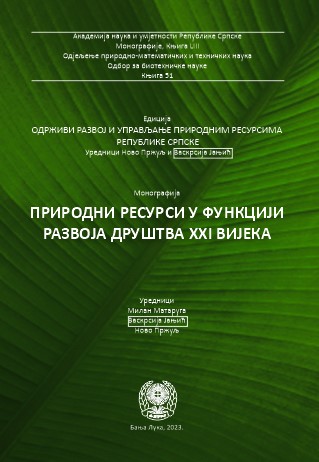Digitalization in the conservation of natural resources and sustainable development
DOI:
https://doi.org/10.7251/EORU2307455BKeywords:
digitalization, natural resources, sustainable development, sensors, remote sensing, big data, artificial intelligence, cloud computing, decision support systemsAbstract
Digitalization is the transformation of the processes of human activity into such a form that uses digital technologies. The aim of this chapter is to provide a comprehensive overview of digital technologies used in the conservation of natural resources and sustainable development, and to present the situation in this area in the Republic of Srpska. In the observation processes digital technologies expand the boundaries of cognition by creating new information. By changing the way we look at things, digital technologies change our way of thinking, help us in understanding complex systems and in reasoning. They are an indispensable part of decision support systems, and by automating the process they facilitate the implementation of activities. The first part of this chapter describes the digital technologies used in the process of observation, from the simple to the cognitive sensors, wireless sensor networks, remote sensing, the Internet of things and services in the cloud, and reasoning and decision making supported through digital technologies such as big data technologies, Geographic information system, artificial intelligence and cloud computing. The role of automation and robotics, as well as embedded and cyber-physical systems in the field of conservation of natural resources and sustainable development is presented. The impact of digital technologies on education and access to information in the field of natural resources is also analyzed. Then, in the second part of the chapter, an overview of the state of digitalization in the Republic of Srpska in the segments related to water and mineral resources, land use and cover, forest resources and biodiversity is given. As everywhere in the world, the management of natural resources in Republika Srpska is becoming increasingly complex, because it is necessary to reconcile the need for accelerated economic growth with the preservation of natural resources, to meet the needs of the present, without compromising the ability of future generations to meet their own needs. On the path to sustainable development, Republika Srpska is making great efforts by acting at the national level and engaging in global initiatives. The activities carried out for the purpose of sustainable development of agriculture, sustainable use of natural resources, in the field of green energy, Industry 4.0 and sustainable tourism, as well as in the field of education and access to informationare presented. For now, the activities are mainly related to the development of information systems, while the application of other digital technologies is at a very low level. It is evident that the exploitation of natural resources, agriculture and a large part of the industry of Republika Srpska continue to rely heavily on outdated methods. A discrepancy was noted between the well-developed information and communication technology sector and the application of digital technologies in the conservation of natural resources and sustainable development. Special attention is paid to the review of scientific research activities in which digital technologies are used for the preservation of natural resources and sustainable development of the Republic of Srpska. The analysis of scientific research activities in this area indicates the fragmentation of research and the small number of multidisciplinary teams, as well as the lack of significant institutional support. In order to make better use of the advantages that digitalization could bring in the preservation of natural resources and sustainable development of Republika Srpska, a multidisciplinary scientific approach and a management policy that is comprehensive, integrated, explicit, open and responsible are needed, as well greater involvement of society as a whole.
